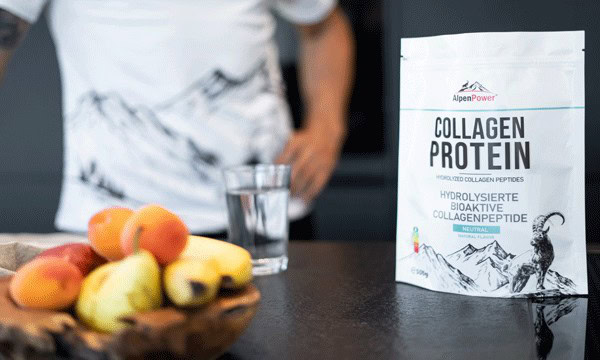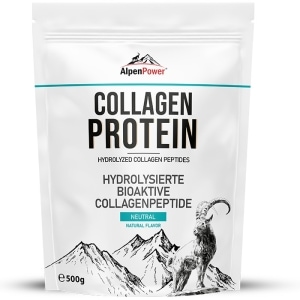A contribution from Michaela Mayr,
qualified nutrition trainer:
https://www.michaelas.net
Collagen: The miracle cure for skin, joints and bones?
Collagen is the new buzzword. Whether in powders, capsules, creams or even drinks – the protein that ensures the elasticity and strength of your skin and joints is advertised everywhere. But is collagen powder really as useful as it is claimed to be, or is it just the latest hype? In this article we examine the scientific background and give you a well-founded assessment.
What is collagen?
Collagen is a substance produced naturally in the body and consists of the amino acids glycine, proline and hydroxyproline. It is the most abundant protein in the body and forms the structure of skin, bones, tendons, ligaments and cartilage. Collagen gives these tissues their strength and elasticity. As we age, the body’s production of collagen decreases. This leads to visible signs of aging such as wrinkles, sagging skin and joint problems. This is where collagen preparations come into play, which promise to compensate for this loss and make the skin firmer and the joints more mobile.
What effect do the preparations have?
Collagen, which can be found on store shelves, is mostly of animal origin. It comes from the bones, skin and cartilage of animals and has a high bioavailability.
It supports:
-
- Skin elasticity and hydration: Keeps the skin firm and hydrated.
- Wrinkle reduction: Reduces the visibility of wrinkles.
- Joint health: Improves joint mobility and relieves pain.
- Bone density: Increases bone density and counteracts bone loss.
Vegan collagen is technically not real collagen, but a plant-based alternative designed to stimulate the body to produce more of its own collagen. It is suitable for vegetarians and vegans.
Practical tips for taking collagen
Collagen is available in various forms including powder, capsules and drinks. In powder form it is versatile as it can be mixed into smoothies, coffee or even soups. Click here for our product.
A common recommendation is to consume around 5 to 10 grams of collagen daily. This amount can be adjusted individually depending on your personal goals and health status. To see the effects of collagen, you should take it continuously over a longer period of time.
Tip: Some studies suggest that taking it with a meal that contains vitamin C improves absorption. This can be done by eating foods rich in vitamin C such as oranges, strawberries, kiwi and peppers.
Is the hype aboutcollagen powder justified?
Our bodies produce collagen, but this process can slow down, especially with age. Supplementing with collagen preparations can therefore be a useful measure to support natural collagen production.
Studies show that collagen supplements provide numerous health benefits, especially for skin, joints and bones. If you want to take advantage of these benefits, it is important to choose a high-quality product from a trusted manufacturer. Look for hydrolyzed collagen as this form is better absorbed.
Tip: In addition to collagen powder, there are other measures to support the body’s own collagen production: a healthy lifestyle with sufficient sun protection, enough sleep for night-time regeneration, regular exercise to improve blood circulation as well as effective stress management to reduce oxidative stress and avoiding smoking and excessive alcohol consumption can promote collagen formation and contribute to healthy skin and strong joints.
Author: A contribution by Michaela Mayr, certified nutrition trainer: https://www.michaelas.net





